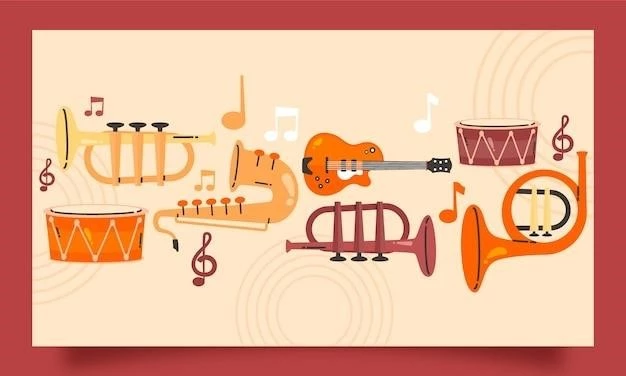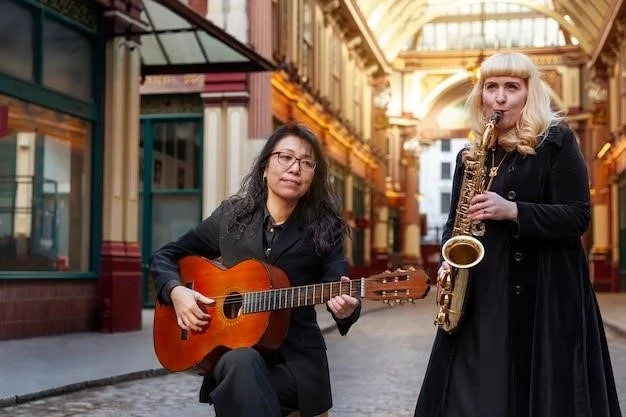Music, a universal language that transcends borders and languages, holds profound cultural significance in societies worldwide․ From ancient rituals to contemporary entertainment, music has played an integral role in shaping human history, identity, and social interaction․ This article delves into the multifaceted cultural significance of music, exploring its diverse roles, anthropological perspectives, and the profound impact it has on our lives․
1․ Music as a Reflection of Culture
Music acts as a mirror, reflecting the values, beliefs, and traditions of a particular culture․ Each culture has its unique musical forms, instruments, and performance practices that have evolved over generations․ For instance:
- Indian classical music, with its intricate ragas and talas, reflects the spiritual and philosophical depth of Indian culture․
- West African drumming and dance traditions often emphasize community participation and celebrate life-cycle events․
- Western classical music evolved within the courts and churches of Europe, reflecting the values of order, harmony, and intellectual expression prevalent in those societies․
By studying a culture’s music, we gain insights into its history, social structures, and aesthetic sensibilities․ Music provides a window into the soul of a society, revealing its joys, sorrows, hopes, and fears․
2․ Music and Social Cohesion
Music possesses a remarkable ability to unite people, fostering a sense of shared identity and belonging․ Throughout history, music has played a crucial role in bringing communities together, strengthening social bonds, and promoting cooperation․
- Religious ceremonies often feature music as a means of connecting with the divine and fostering a sense of communal worship․
- National anthems evoke feelings of patriotism and national unity․
- Folk songs often transmit cultural values, historical narratives, and social commentary across generations․
Music creates a shared emotional experience that transcends individual differences, fostering empathy, understanding, and a sense of collective identity․
3․ Music and Ritual
Music has been an integral part of rituals and ceremonies across cultures and throughout history․ From ancient shamanistic practices to modern religious services, music plays a vital role in marking important life events, transitions, and spiritual experiences․
- Birth rituals often incorporate lullabies and gentle melodies to welcome newborns into the world․
- Marriage ceremonies frequently feature music to celebrate the union of two individuals and their families․
- Funerals often utilize music to express grief, honor the deceased, and provide solace to mourners․
In ritual contexts, music transcends its purely aesthetic qualities, becoming a powerful tool for connecting with the sacred, marking significant life transitions, and reinforcing cultural values․

4․ Music and Identity
Music plays a crucial role in shaping individual and collective identities․ Our musical preferences, experiences, and creative expressions contribute to our sense of self and our understanding of the world around us․
- Musical taste often aligns with social groups, subcultures, and personal values, acting as a marker of identity and belonging․
- Learning and performing music can foster discipline, creativity, and self-expression, contributing to personal growth and development․
- Music communities, whether online or offline, provide spaces for shared experiences, social interaction, and the formation of meaningful connections․
Through music, we define ourselves, connect with others who share our passions, and express our unique perspectives and experiences․
5․ Music and Globalization
In an increasingly interconnected world, music transcends geographical boundaries, facilitating cultural exchange and influencing musical traditions across the globe․ Globalization has led to the fusion of musical styles, creating new hybrid genres and expanding the reach of musical traditions․
- World music has gained popularity, introducing audiences to diverse musical traditions from around the globe․
- Musical collaborations between artists from different cultures have resulted in innovative and boundary-pushing musical expressions․
- The internet and digital platforms have made it easier than ever to access and share music from every corner of the world․
While globalization presents challenges to the preservation of traditional music cultures, it also fosters cross-cultural dialogue, understanding, and the creation of new and exciting musical forms․

Conclusion
Music’s cultural significance is undeniable․ It reflects our values, unites us as communities, marks important life events, shapes our identities, and connects us across cultures․ As we continue to explore the power of music, we gain a deeper appreciation for its profound impact on our lives and its enduring ability to inspire, heal, and transform․










